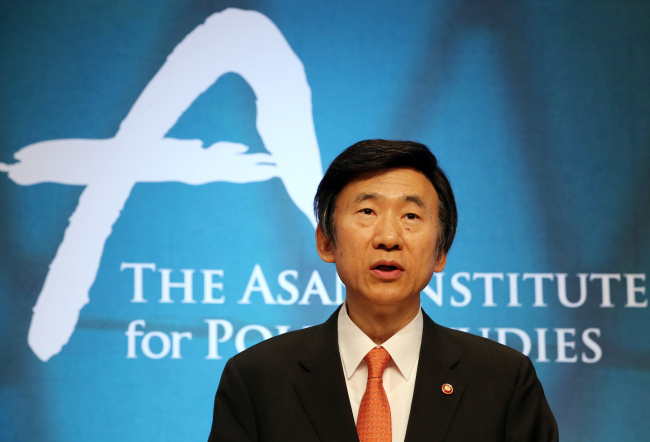After surviving reshuffle, Yun faces heavier diplomatic agenda
By Shin Hyon-heePublished : July 23, 2014 - 20:32
After weathering recent cabinet shake-ups, Foreign Minister Yun Byung-se is coming under pressure to improve testy relations with South Korea’s neighbors by untangling a matrix of diplomatic and geopolitical interests.
Relations between Korea and Japan are at their lowest ebb in decades. An erratic Pyongyang continues to develop atomic weapons, whereas six-nation denuclearization talks remain in their sixth year of dormancy. Yet the Sino-U.S. rivalry is growing fierce, propelled by fast-evolving regional dynamics, stoking tension and forcing Seoul to make tricky choices.
Yun, 61, is the architect of President Park Geun-hye’s pet foreign policy schemes, ranging from “trustpolitik” and her road map for a peaceful Northeast Asia to the Dresden proposal. With North Korea’s denuclearization being the core element, the policies chiefly focus on trust as the foundation for cooperation, while stressing a principled approach to sovereignty and historical issues.
Relations between Korea and Japan are at their lowest ebb in decades. An erratic Pyongyang continues to develop atomic weapons, whereas six-nation denuclearization talks remain in their sixth year of dormancy. Yet the Sino-U.S. rivalry is growing fierce, propelled by fast-evolving regional dynamics, stoking tension and forcing Seoul to make tricky choices.
Yun, 61, is the architect of President Park Geun-hye’s pet foreign policy schemes, ranging from “trustpolitik” and her road map for a peaceful Northeast Asia to the Dresden proposal. With North Korea’s denuclearization being the core element, the policies chiefly focus on trust as the foundation for cooperation, while stressing a principled approach to sovereignty and historical issues.

In the year and a half since Park’s swearing-in, Yun has emerged as her most trusted aide on foreign and unification policies. He is one of the few remaining inaugural ministers, while most other Cabinet members have been replaced -- either in the aftermath of the Sewol ferry tragedy, or due to discord with the president, policy failures or gaffes.
Many of his colleagues and aides credit Yun with his professionalism, inclination to pay great attention to detail and tenaciousness in every matter. He has also been engineering the drawing-up of nearly perfect papers, an upshot of overnight marathon discussions that Foreign Ministry officials dubbed “conclaves.”
But for all his efforts, many of Park’s much-touted diplomatic initiatives appear to be on the verge of derailment, putting Yun to a critical test.
Seoul is walking a tightrope between two essential goals -- sustaining security cooperation with the U.S. and Japan to counter North Korean threats, and boosting its partnership with China to foster economic vitality and achieve a nuclear-free peninsula.
The cross-border mood also remains frosty, with both the six-party talks and high-level inter-Korean dialogue showing no signs of reviving.
The deepest thorn in its side is bilateral relations with Japan. The ties, already snowed under in historical and territorial brawls, appear to be plunging further as Prime Minister Shinzo Abe spurs a series of hawkish policies while refusing to repent for wartime atrocities.
Yet calls are growing in and out of the government for Yun to employ his statesmanship in tackling the festering feuds and improving the testy relationship. Though the Abe administration is to blame for the ongoing downward spiral, he should not indulge in “Japan-bashing” targeting domestic opinion, observers say.
“Still, as the foreign minister, he should take the driver’s seat and strive to bring a turnaround, no matter how bad the circumstances are,” a retired diplomat told The Korea Herald, asking for anonymity due to the sensitivity of the matter.
Deepening the dilemma is U.S. backing for Japan’s drive for a normal state in the face of budgetary and economic woes. Beijing is seeking closer alignment with Seoul while hardening its line against Tokyo, sparking fears of an armed conflict in the East China Sea over disputed islands.
At a university lecture here early this year, President Xi Jinping extolled China-South Korea cooperation, saying they fought and overcame adversity together during Japan’s “barbaric” invasion at the end of the 16th century. Adding fuel to the flames, Seoul revealed that Park and Xi during their meeting shared “concerns and regrets” over Abe’s revisionist push, which many called a diplomatic faux pas and apparently irked Washington.
The disclosure was apparently aimed at serving Park’s political interests at home given intensifying public resentment toward the Abe government. Foreign affairs and security has been the conservative president’s fortes that shore up her approval ratings.
“Crammed between historical identity and U.S. alliance-based security interests, South Korea has to fight harder now, not only for its national interests but also against simmering nationalism and domestic political temptation,” a foreign policy expert said on customary condition of anonymity.
Despite high expectations for Yun, some officials expressed skepticism given Cheong Wa Dae’s strong voice on sensitive diplomatic issues.
“Even if a minister enjoys the president’s full confidence, his clout will inevitably be limited as the president has a strong grip especially over issues related to North Korea or Japan,” a senior Seoul official said.
“It’s about her principles, so it’s extremely hard to change things no matter who (the minister is).”
By Shin Hyon-hee (heeshin@heraldcorp.com)








![[KH Explains] Hyundai's full hybrid edge to pay off amid slow transition to pure EVs](http://res.heraldm.com/phpwas/restmb_idxmake.php?idx=644&simg=/content/image/2024/04/18/20240418050645_0.jpg&u=20240419100350)






![[From the Scene] Monks, Buddhists hail return of remains of Buddhas](http://res.heraldm.com/phpwas/restmb_idxmake.php?idx=652&simg=/content/image/2024/04/19/20240419050617_0.jpg&u=20240419175937)

![[KH Explains] Hyundai's full hybrid edge to pay off amid slow transition to pure EVs](http://res.heraldm.com/phpwas/restmb_idxmake.php?idx=652&simg=/content/image/2024/04/18/20240418050645_0.jpg&u=20240419100350)

![[Today’s K-pop] Illit drops debut single remix](http://res.heraldm.com/phpwas/restmb_idxmake.php?idx=642&simg=/content/image/2024/04/19/20240419050612_0.jpg&u=)